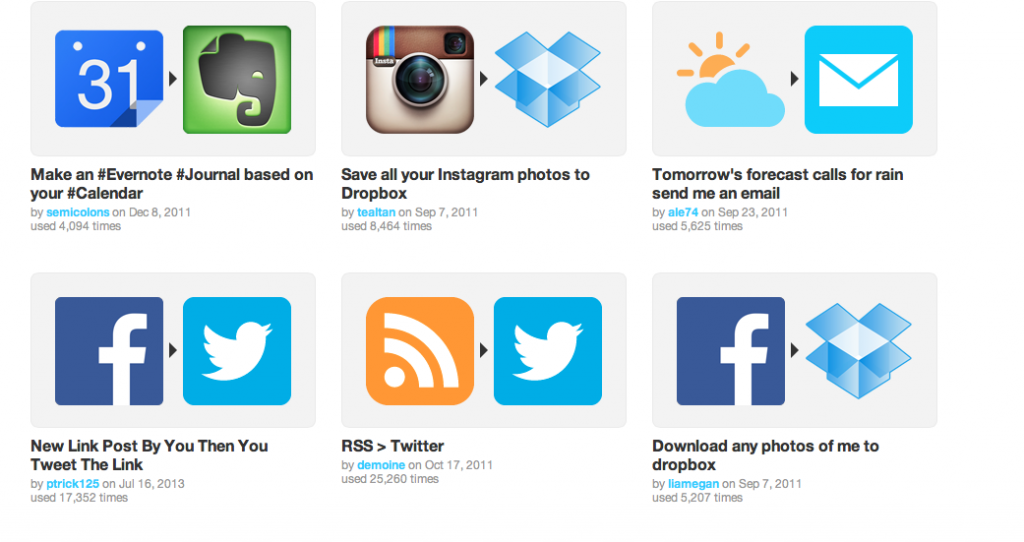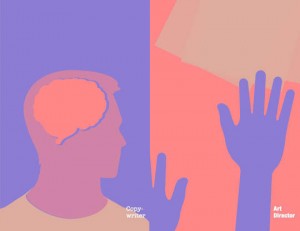
via Instagram http://instagram.com/p/c_EWL_x4Hw/
My first Instagram / IFTTT post! – Delicious homemade pizzas and wine

via Instagram http://instagram.com/p/c5OUEox4Hk/
If This, Then That!
Hello friends, this is a How To that I’m buying – as per the Networked Media blog post about How To’s For Sale.
If This Then That is a brilliant program that’s really easy to use and can work wonders for your internet social identity. The essential concept behind it is:
If this (I use this social networking program), then that (it will automatically post to/be notified by/update this program).
This is a really helpful thing to do because it will link up all your online profiles together to create one coherent online identity. It also helps curate all your communication technologies together, even including SMSing, emailing, weather apps etc.
It’s really easy to use and the giant buttons and simple language contribute to this.
It’ll basically ask you to create recipes, that is you add Ingredients (an action performed on one social networking device called a Trigger such as Instagram) and press Activate (after logging in) then it will ask you for the Action , (the that part of the recipe; such as “post it onto Facebook” or “send me a text message” etc).
An example of a recipe that I created is here; I wanted to automatically post all photos from my Instagram account straight to my Blog here.
As I stated in the description, this recipe is “If I post a photo on Instragram, it will create a post automatically on my blog.”
It’s not just about linking social networking stuff either, you can virtually link every bit of communication technology you own. Here are some examples of some cool recipes that you can create on IFTTT. My favourite is “If it’s going to rain tomorrow, then text me!”
Anyway, hope this helped!! And hopefully this will successfully satisfy the Networking blog’s suggestions of students helping students!
xxxxxx
New York City Photoblog
This guy is amazing. His work is phenomenal. It does everything photography should be; tell a thousand stories, make the viewer curious and interested while being present in a well thought out and skilful (both technically and aesthetically) manner. He captures NYC so well.
and here are some examples.
Learning stuffs
I finally know how to embed a video into my posts! Thanks to lovely Anita who showed me how to share a video. I literally searched ‘cats’ and found this video and I think it’s so fabulous that I’m going to keep it here. You can probably see a theme throughout my blog… I really like cats..
This is how I feel my life is right now

As I completely run around in circles, juggling four jobs, an internship, uni, a boyfriend and social life, not really going in any direction at all but mindlessly spinning around like a cartoon character, amused bystanders look on, laughing at my benign efforts at trying to have any sort of control over my life.
What a deep analysis of a silly mindless .gif.
oohhHHhhH life.
As We May Think – Wk3 Reading
This article seemed to jump around for me a bit; it started talking about the fascinations of science and technology, then went to talk about the reception or lack thereof of great research papers and struggles in producing ideas, then began speaking of great ideas for photography and filmography.
However I think the general gist, which involved the jumping around was to discuss how scientists should make more accessible the “bewildering store of knowledge” available, using examples from the past and future to demonstrate this.
Here are some of my notes I picked up:
- Science has contributed to significant developments for humankind; increased control over material environments, increased security, improved good, clothes and shelter, offered freedom from disease and an increased life span and given us swift communication between individuals
- However, there are endless amounts of research out there, with thousands of conclusions, research papers, findings and scholarly works. This article suggests that the time spent creating these amazing things is sometimes not proportionate to its reception in the world or the time spent reading/studying them.
- There is significant work out there, that despite its potential to revolutionise a certain field, becomes lost in the “mass of the inconsequential” which is quite sad
- Past examples à the calculating machine that had the economies of the situation against it; labour costs and unreliability outweighed its usefulness and innovation. Babbage’s arithmetical machine suffered a similar fate; the construction and maintenance costs were too heavy
- Machines these days can be constructed with great economy of effort, that is, the time and labour spent constructing it is beaten by its success and significance.
The second part of the article about the Walnut-cam slightly confused me, however I believe it was a future example of how innovation in a field should be grasped and worked towards, not turned away because of complicated logistics.
Unlecture #3
This week’s unlecture was quite interesting. Following a similar pattern, it was unlike the last two in that it was not as interactive and open as last week but not as ranty as first week. However it still inspired some great thinking in me.
The reptilian brain concept was sort of funky à we all have a fight or flight instinct that is entirely instinctual and prehistoric in a way; deeply embedded into our human nature. It can be applied to almost anything; for example my anxieties about my workload this semester (uni work, internships, jobs etc) is something I can either tackle head-on or completely run away and hide from. The more I use my flight instinct against it the more it will overwhelm me, so my lizard brain is telling me that fight is the right option. Thanks, lizard brain!
I enjoyed Adrian’s rant about how modern education is too similar to a ‘shop assistant’ style of learning; we go into a store (or uni) and try pick what we like (e.g. decide on a course/what we want to learn/our goals) and if it doesn’t work for us (if we feel our teachers, lectures, classes aren’t working), it’s so easy to blame the shop assistant (uni) and demand another size or style. That was a bit confusing to type but I completely understand it in my head; that university is too similar to a retail environment; we shop and choose what we want then complain if it isn’t right for us.
However, what we should be concertrating on is that if we feel that something in our courses isn’t working for us, like our teachers, classes, lectures, assignments, it is our responsibility to make it work, not to complain about it. We should see what we can get out of it, not complain about what we don’t.
Education is an experience, not a commodity or a right.
I thought that was pretty insightful seeing as I see so many people complaining about uni but clearly RMIT has some sort of successful system in place if thousands of kids are graduating and getting prestigious jobs every year…
Like a romantic waltz (I’m loving Adrian’s metaphors), we shouldn’t give up and stop dancing just because we’re finding the steps difficult or foreign to us.
This lecture was different and I’m still deciding whether or not it worked for me, but nonetheless I’m excited for next week’s.
I found this extremely interesting.
I found this article/blog post on mashKULTURE, an art and culture blog. I found it very interesting.
I’m not sure if anyone else will, but lately I’ve been thinking that Advertising may be my thing instead of Media. I got told that in Advertising there are essentially two career paths: Art Director or Copywriter. Basically if I chose to do Advertising that I would have to choose between them. I’m terrible at designing and drawing so couldn’t be an art director and I’m too creative to be a Copywriter and just concern myself with words (sorry, that was a complete contradiction).
Anyway, this visually represents the difference between the two professions. Pretty cool stuff! Copyright on the left; art director on the right.
Bruce Sterling on Design Fictions.
This article, Bruce Sterling on Design Fictions (this week’s reading) was very interesting to me. I read it literally two hours after having an interesting discussion with a friend over coffee regarding the development of technology. We pondered how in the 2000’s when each “new” equipment came out; Motorola flip phones, Limewire, portable laptops, USB’s, iPods etc., people were so blown away by how futuristic and life-changing they would be, however soon enough all those technologies became completely redundant with faster, smaller, thinner and better technology.
By this natural progression of technological advancement, does this mean that one day the iPhone will be redundant? A macbook air? Utorrent? Will there be a time where people look back on it as nostalgically and fondly as I do to the first iPod, floppy disks, myspace and Gameboy advance? It spooks and baffles me, however it does make me excited to see what the future will hold; how we could possibly improve from the iPhone!! This course has really made me start thinking about how much we take our incredible communication technologies for granted. They didn’t just appear out of nowhere, they’re intricately and cleverly designed wonders of technology created by absolute geniuses (or magic). However our culture has adapted around them so dependently that they’re no longer technological marvels but just parts of everyday life that we can’t live without.
This article was really interesting because it made me think further into this concept but with more of a logical understanding; that there are people who dedicate their time to Design Fiction; the process of imagining, designing and pseudo-creating (i.e. showing through a video) brand new technology. Each bit of design technology is like a look into the possibilities of the future, “giving futurism a second wave” particularly in the minds of cynics like me who think we’ve officially beaten technology with the iPhone and there’s no possible improvements to it.
This article was great because it included videos that demonstrated the concept clearly; the Glass Technology video was incredible and honestly I could see something like that happening in the near future. It’s linked to the iPhone technology of on-the-go easy access to information and communication through screens, but went above and beyond a tiny screen on your iPhone to showing how this idea could spread to every glass surface whether it be a tabletop or a mirror. It totally blew my mind.
Design Fiction is honestly something I will look into deeper, as it really interested me to see where creative minds envision the future being in a few years time (even film and TV makers when they use “futuristic” technology in their works). This article has really made me start thinking about the future and what amazing inventions I use in my everyday life that were once just a bizarre sci-fi dream in someone’s head.
















